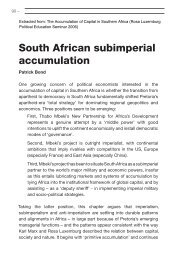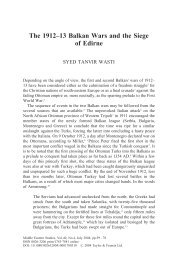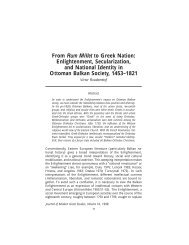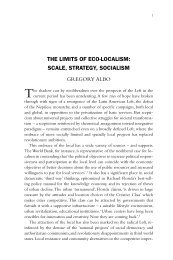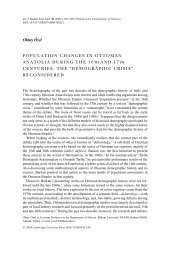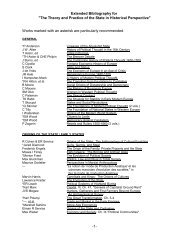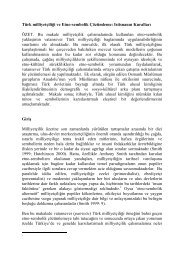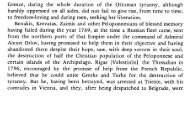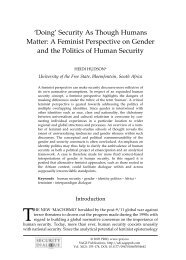Hall, The Balkan Wars
Hall, The Balkan Wars
Hall, The Balkan Wars
Create successful ePaper yourself
Turn your PDF publications into a flip-book with our unique Google optimized e-Paper software.
THE BALKAN WARS, 1912-1913direct annexation of Bosnia-Hercegovina by Austria-Hungary later that sameyear caused great agitation throughout the <strong>Balkan</strong>s. Both the Serbs and theMontenegrins perceived in the Austro-Hungarian annexation of Bosnia-Hercegovina a major setback to their national aspirations. Prince Nikolabombastically called for "sacrifices of blood" to prevent the annexation.I4<strong>The</strong> Serbs were also aware of their own relative weakness and isolation. Torectify this, they began talks aimed at common action against the HabsburgMonarchy. <strong>The</strong> result of these talks was an alliance signed on 22 October1908.15 A major goal of this alliance was a common border in the Sandjak ofNovi Pazar, that finger of Ottoman territory separating Montenegro andSerbia which had been occupied by Austria-Hungary since 1878, in part toisolate Montenegro from Serbia. Although the Austro-Hungarians didevacuate the Sandjak in 1908, the Serbo-Montenegrin alliance did not survivethe Bosnian crisis. <strong>The</strong> old problems of national and dynastic rivalry returnedto render it defunct by late 1909. <strong>The</strong> diplomatic embarrassment of Russiafurther emphasized the need for the Serbian states to find <strong>Balkan</strong> allies.<strong>The</strong> Bulgarians alone in the <strong>Balkan</strong>s obtained some satisfaction from theBosnian crisis. <strong>The</strong>y used the annexation as a cover to declare a formalindependence from the Ottoman Empire. <strong>The</strong> Bulgarians gladly perceivedin the annexation crisis a further erosion of the Berlin settlement. <strong>The</strong> GreatPowers themselves, and especially Austria-Hungary, appeared to participatein the dismantlement of the Berlin settlement, the most important legalobstacle to the realization of <strong>Balkan</strong> national aspirations.<strong>The</strong> year after the Young Turk revolt, a league of Greek officers likewiserebelled and brought about the collapse of the government. <strong>The</strong> new Greekgovernment asserted a more overtly nationalistic policy and attempted totake advantage of the ongoing <strong>Balkan</strong> crisis. It immediately raised the Cretanissue. In 1908, in the aftermath of the annexation of Bosnia-Hercegovinaand the proclamation of Bulgarian independence, Crete had announced aunion with Greece. <strong>The</strong> new government, however, was unable to effectthis union. Ottoman obstinacy and Great Power indifference again frustratedGreek aspirations. <strong>The</strong> next year the withdrawal of the Great Powercommission, which had controlled Crete since 1898, heightened tensionsbetween Greece and the Ottoman Empire. In 1910 only Prime MinisterEleutharios Venizelos' refusal to seat Cretan representatives in the Greekparliament prevented another war between the Greeks and the Ottomans.Albanian stirringsUp until this point the Albanians had staunchly supported Ottoman rule inthe <strong>Balkan</strong>s. <strong>The</strong> majority of Albanians shared the Islamic faith and cultureof the Ottomans. Over the centuries they had acquired certain privilegesfrom Constantinople regarding taxation and the possession of weapons.Albanians made up a majority of the population in the Ottoman provincesBALKAN WAR ORIGINSofJanina, Kosovo, and Scutari and a significant portion of the population ofthe province of Monastir.Albanians initially,hailed the new regime in Constantinople. <strong>The</strong>y hopedit would initiate reforms leading to a recognition of Albanian autonomywithin the empire. <strong>The</strong>se hopes were soon disappointed. <strong>The</strong> newgovernment's centralization policies aroused fears of loss of privilege andeven assimilation in the Albanian areas of the Ottoman Empire. Discontentswept over much of the Albanian-inhabited regions, and open revolt brokeout first among the Catholic tribes in the north but soon spread throughoutthe Albanian regions in the winter and spring of 1910. In May 1911, anAlbanian committee in Vlore (Valona) demanded the unification of theOttoman provinces of Scutari, Janina, Kosovo, and Monastir into anautonomous Albania within the Ottoman Empire. In an effort to restoreOttoman prestige, Sultan Mohammed V visited Kosovo in June 191 1. Thishad little effect on the revolt. <strong>The</strong> government never completely succeededin suppressing this uprising before the outbreak of the <strong>Balkan</strong> <strong>Wars</strong>.<strong>The</strong> growth of an Albanian national self awareness in the Kosovo regionchallenged Serbian pretensions there.'Vhis issue compelled the Serbs toact expeditiously. <strong>The</strong>y feared that Austrian machinations were behind theAlbanian unrest. <strong>The</strong> Greeks were also concerned about the Albanian revolt.<strong>The</strong> development of Albanian particularism infringed on Greek desirada inEpirus and threatened to involve Greece prematurely in a war with theOttoman Empire." Albanian national stirrings also threatened the aspirationsof Montenegro to parts of northern Albania, including the important city ofScutari. Albanian nationalism threatened the national aspirations of Greece,Montenegro, and Serbia. This common problem provided the incentive forthese three <strong>Balkan</strong> countries to act against it and increasingly to act together.By 1911 Nikola, who had granted himself the title of King of Montenegrothe previous year, involved his country in the northern Albanian revolt. Hesupported the rebels against the Ottoman authorities with arms and sanctuaryTo retain control of the last important Islamic region of their Europeanholdings, the Ottomans sent troops to suppress the Albanian revolt. Fightingon the <strong>Balkan</strong> Peninsula then intensified in Albania in 1911.Formation of the <strong>Balkan</strong> leagueAfter the crisis of 1908-9, both the Belgrade and the Sofia governmentsdecided to resolve their national unity issues.'Vhe Serbs sought supportagainst the escalating anti-Serbian policies of Austria-Hungary. <strong>The</strong>Bulgarians remained focused on their aspirations in Macedonia and, to alesser degree, Thrace. Both governments wanted to act before the YoungTurks could implement meaningful reforms.Another reason for the intensification of Bulgarian and Serbian effortson national issues came from radical activists within their own countries.




